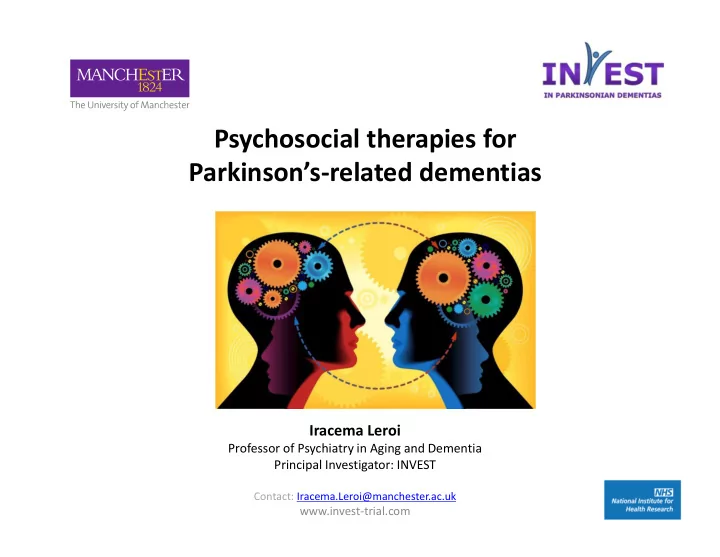

Psychosocial therapies for Parkinson’s-related dementias Iracema Leroi Professor of Psychiatry in Aging and Dementia Principal Investigator: INVEST Contact: Iracema.Leroi@manchester.ac.uk www.invest-trial.com
What is dementia? What is dementia due to Parkinsonian disorders?
The WHO consequences of dementia… Impairment Disability Handicap
The consequences of dementia… Impairment Disability Cognitive enhancing medications (i.e. donepezil, rivastigmine) Handicap
The consequences of dementia… Impairment Disability Restriction in function • Varies according to personal, social, Handicap environmental factors • May not reflect level of impairment
The consequences of dementia… Impairment Disability Handicap Exclusion from society
Interventions in dementia • Impairment medication • Disability Psychosocial interventions • Handicap
Psychosocial Interventions for dementia SM5 • Cognitive (brain) training: – Learning new methods to enhance information coding or retrieval of previously learnt material • Cognitive stimulation: – Stimulating thoughts, interactions, opinions; errorless learning • Cognitive rehabilitation: – Uses strategies (memory aids, daily routines to support memory, etc) to compensate for cognitive impairment
Slide 8 SM5 This is fine, if I was being picky I would say it would benefit from an image of each example. Sheree McCormick, 20/02/2018
Which therapy for PD?
Which therapy for PD? Off the shelf?
Which therapy for PD? Off the shelf? Totally new therapy?
Which therapy for PD? Off the shelf? Totally new therapy? Adapt an existing therapy?
Which therapy for PD? Off the shelf? Totally new therapy? Adapt an existing therapy? ??Cognitive Stimulation Therapy
Aims • To develop a cognitive stimulation therapy adapted for PDD/DLB 1 • To undertake a study to: • Assess feasibility • Evaluate process 2 • Understand efficacy • To provide recommendations for a subsequent large-scale trial. 3
Cognitive Stimulation for Parkinsonian Dementias (CST-PD) • Low tech, low cost therapy – Manual consisting of 250 pages of cognitively stimulating activities • Home-based • Led by a companion (partner, relative, family friend) • 10-weeks, 3x a week, 20-30min • Personalised INVEST video : https://youtu.be/GZ-wh__SJ-M
Participants/Method People with 76 PD-MCI/ Companions PDD/DLB Manchester Data collection: • London Assessments • • NW Coast Interviews • • Derby Companion diary • •
Results – feasibility of intervention delivery It’s finding things • Couples engaged in meaningful out about mum that I didn’t know activity really […], so that’s been good. - Companion 4 • Both members of the dyad benefitted There were times where we laughed , • Move away from ‘structured and I don’t think we used to laugh a lot. therapy for person with PDD’ to - Companion 4 ‘supporting the health and well- being of couples living with PDD’
Results – acceptability of therapy (1) • Reminiscence was extremely It made him think popular again about the past , it gave him an opportunity to • Participants and companions recall, to reflect . - Companion 1 have reminiscence-efficacy • Talking about a former self provided opportunity to feel It turned the key ‘valued’ and opened another door . - Companion 5 • Support reminiscence through video and still images/ personal diaries
Results – acceptability of therapy (2) • Some companions felt the So, you’re therapy was a chore thinking I need to drag it out . - Companion 2 • Some participants lost their train of thought He worries about saying the wrong thing and • Add auditory and written because his voice is a bit cues to make the activities slow and sometimes he loses his train of thought . seem effortless (reduce - Companion 3 cognitive load)
Results – Feasibility of intervention deliverer • Individual sessions were longer than recommended (31 vs 30 minutes) • Conducting 3 sessions per week was difficult to schedule – companions are time-poor • A lay deliverer/virtual session can overcome this • Record adherence automatically via technology-dependent methods
Results – Feasibility of assessments Assessments: • were cumbersome to administer and receive • did not capture immediate effects of therapy • were inconsistently administered across assessors • SMART technology can address these issues
Recommend
More recommend